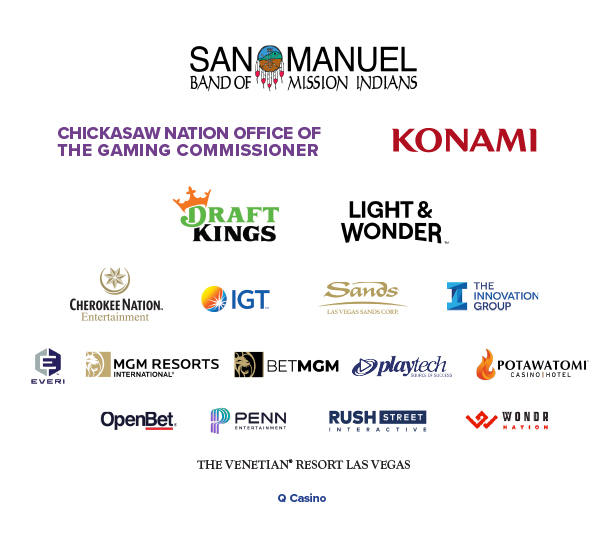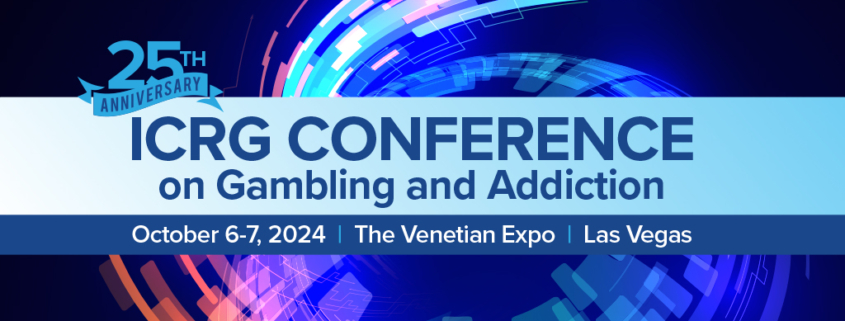
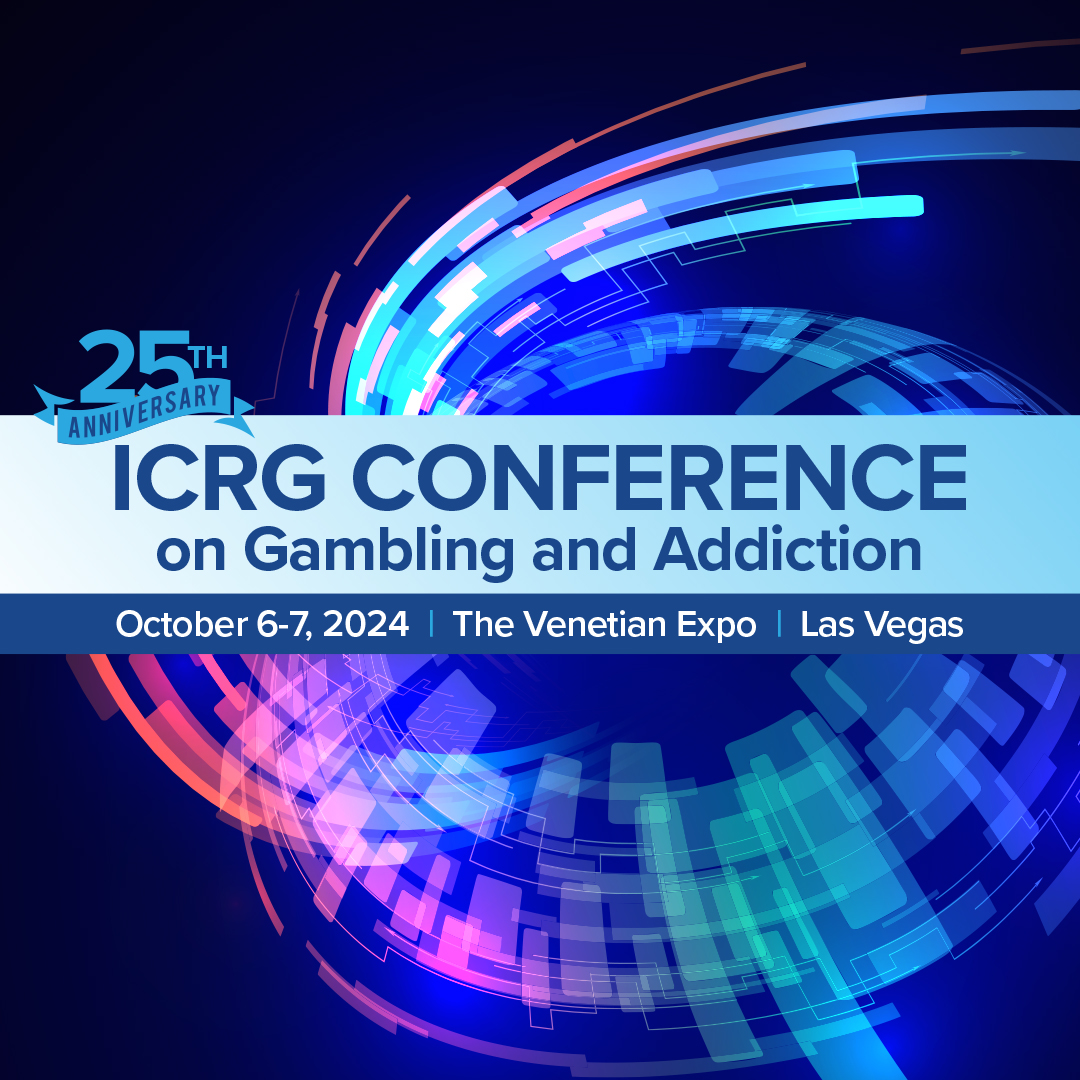
The International Center for Responsible Gaming (ICRG) is pleased to invite you to the 25th annual ICRG Conference on Gambling and Addiction, the preeminent science-based forum featuring the latest research on gambling disorder and responsible gambling. This educational experience offers valuable insights for all stakeholders:

Download the conference syllabus
Treatment Providers and Public Health Professionals will engage in dialogue about:
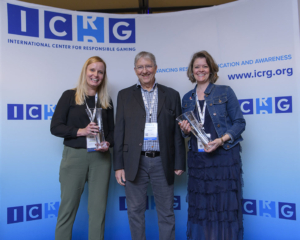
- Engaging and retaining clients
- A new digital format for CBT and new pharmaceutical treatments
- Why people with gambling disorder don’t seek treatment
- The impact of the changing gambling landscape on clinicians
- Military veterans with gambling problems
- Health disparities in the Latinx community
- Culturally competent, trauma-informed care for Native Americans
Responsible Gambling Professionals, Other Industry Professionals, and Regulators will engage in dialogue about:
- The state of responsible gambling from the perspective of a researcher and a military veteran in recovery
- Players’ understanding of who is responsible for responsible gambling
- How scientists and industry can work together on research projects
Researchers will engage in dialogue about:
- How to investigate digital approaches to prevention and recovery
- The potential of research on ketamine, TMS and psychedelics for gambling disorder
- The state of research on military veterans
- How to develop and test culturally appropriate interventions for minority populations
- How to investigate health disparities among Hispanic communities
- New research presented at the poster session
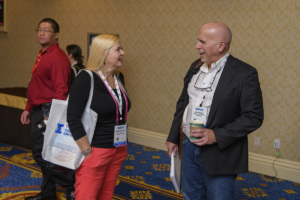 All this, plus 13 continuing education hours approved by national and state entities for treatment providers, continuing legal education hours, and a poster session showcasing new research and networking opportunities with colleagues from around the world.
All this, plus 13 continuing education hours approved by national and state entities for treatment providers, continuing legal education hours, and a poster session showcasing new research and networking opportunities with colleagues from around the world.
As we celebrate our 25th anniversary, the ICRG Conference on Gambling and Addiction remains dedicated to delivering the highest quality, research-based programming for all stakeholders in the gambling field. Join us in Oct. as we reflect on a quarter-century of groundbreaking work and look ahead to the future impact of our collective efforts. We look forward to your participation in this milestone event!
25th Annual Conference Details
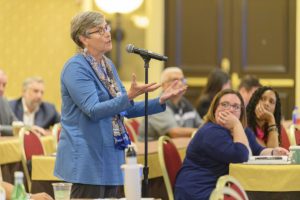
8 a.m. - 5 p.m.
Registration
10 a.m. – Noon
Pre-Con Workshop for Treatment Providers (2 CE Hours) Treating Gambling Harms: Valuable strategies for engaging and retaining our clients.
Speaker: James Whelan, PhD, University of Memphis
1 – 1:15 p.m.
Welcome
1:15 – 2:15 p.m.
Keynote (1 CE Hour) Medical Interventions for Gambling Disorder: The Past, Present, and Future
Speaker: Jon E. Grant, JD, MD, MPH, The University of Chicago
2:30 – 3:30 p.m.
Plenary Session (1 CE Hour) Digital CBT: Expanding Treatment Options for Gambling Disorder
Speaker: Marc Potenza, MD, PhD, Yale University School of Medicine
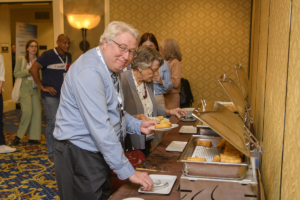
3:30 – 4 p.m.
Refreshment Break
4 – 5 p.m.
Plenary Session (1 CE Hour) Military Veterans and Gambling Problems: What does the research say?
Panel: Shane Kraus, PhD, University of Nevada, Las Vegas Nathan Smith, PhD, Kindbridge Research Institute Marc N. Potenza, MD, PhD, Yale University School of Medicine
5:15 – 6:15 p.m.
Plenary Session (1 CE Hour) What’s on the Horizon? Ketamine, Psychedelics and Transcranial Magnetic Stimulation for Gambling Disorder
Panel: Jon E. Grant, JD, MD, MPH, The University of Chicago Lucy Lan, MD MBA, Chief of Interventional Psychiatry at VA Southern Nevada Healthcare and University of Nevada, Las Vegas
6:30 – 8 p.m.
Reception and Poster Session
7 a.m. – 5 p.m.
Registration
7 – 8 a.m.
Networking Breakfast Open AA/GA Meeting
8:15 – 9:15 a.m.
Plenary Session (1 CE Hour) Disparities for Gambling Treatment Service Use in the Latinx Community
Panel: Michael Campos, PhD, University of California, Los Angeles Hugo Ramirez, Vision y Compromiso9:30 – 10:30 a.m.
Plenary Session (1 CE Hour) Why People with Gambling Disorder Don’t Seek Treatment?
Panel: Jennifer Grant Weinady, PhD, Ohio University James Whelan, PhD, University of Memphis10:30 – 11 a.m.
Refreshment Break
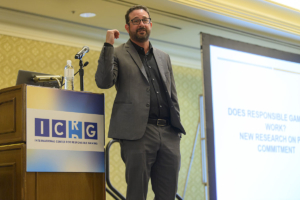
11:15 a.m. – 12:15 p.m.
Plenary Session (1 CE Hour) Mindfulness-Based Relapse Prevention for the Treatment of Gambling Disorder among U.S. Military Veterans: Case Series and Feasibility
Speaker: Shane Kraus, PhD, University of Nevada, Las Vegas12:15 – 1:15 p.m.
Awards Luncheon
CONCURRENT SPECIAL INTEREST TRACKS Note: All attendees are welcome to participate in either track.
PUBLIC HEALTH TRACK1:30 – 2:30 p.m.Focus Group on The Changing Landscape of Gambling for Treatment Providers (1 CE Hour) Leader: Gloria Miele, PhD, UCLA Integrated Substance Abuse Programs Focus Focus Group: Deirdre Querney, MSW, CPGC, CCAC, Alcohol, Drug & Gambling Services, City of Hamilton Elizabeth Thielen, LPC, PCGC, Nicasa Behavioral Health Services Lojann Hooee, LADAC, San Felipe Behavioral Health and Peoples work - New Mexico2:45 – 3:45 p.m.Healing The Spirit of Addiction: Providing Culturally Competent, Trauma Informed Care for Gambling Addiction Treatment for Native Americans (1 CE Hour) Panel: Tonya Elliott, PhD, University of Louisiana at Monroe Jacob Coin, Executive Advisor to the San Manuel Tribal Council |
INDUSTRY TRACK1:30 – 2:30 p.m.Who’s Responsible for Responsible Gambling? What Players Say (1 CE Hour) Speaker: Eric Louderback, PhD, Cambridge Health Alliance and Harvard Medical School2:45 – 3:45 p.m.Science and Industry: Collaborating on Responsible Gambling Research (1 CE Hour) Panel: Jennifer Shatley, DPP, Responsible Gaming Online Association Eric Louderback, PhD, Cambridge Health Alliance and Harvard Medical School James Whelan, PhD, University of Memphis |
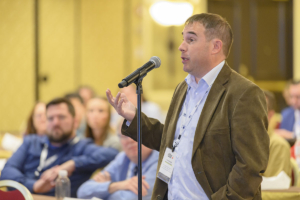
3:45 – 4 p.m.
Refreshment Break
4 – 5 p.m.
Plenary Session (1 CE Hour) Responsible Gambling, Finding Goldilocks, and The Nate-Dave Problem: A dialogue on responsible gambling
Panel: Dave Yeager, ROTC Program Coordinator Nathan Smith, PhD, Kindbridge Research Institute5 – 6 p.m.
Plenary Session (1 CE Hour) Celebrating 25 Years of ICRG: Reflecting on Past Achievements and Envisioning the Future of Gambling Research
Panel: Travia Sztainert, PhD, ICRG Gloria M. Miele, PhD, UCLA Integrated Substance Abuse Program (ISAP) Sarah E. Nelson, PhD, Cambridge Health Alliance Aaron Kaufer, Pennsylvania House of Representatives Alan Feldman, PhD, ICRG and University of Nevada, Las VegasJames Whelan
Pre-Con Workshop for Treatment Providers: Treating Gambling Harms: Valuable strategies for engaging and retaining our clients
Learning Objectives– As a result of the program, attendees will be able to:
- Apply evidence-based strategies to reduce gambling symptoms and behaviors.
- Engage clients more effectively to address treatment hesitancy.
- Develop approaches to decrease dropout rates in gambling harm treatment programs
Jon E. Grant
Keynote: Medical Interventions for Gambling Disorder: The Past, Present, and Future
Learning Objectives– As a result of the program, attendees will be able to:
- Evaluate the historical development of medical interventions for gambling disorder.
- Analyze current behavioral and pharmaceutical treatment approaches.
- Predict future trends in medical treatments for gambling disorder and their potential impact on recovery.
Dr. Marc N. Potenza M.D., Ph.D.
Plenary Session: Digital CBT: Expanding Treatment Options for Gambling Disorder
Learning Objectives – As a result of the program, attendees will be able to:
- Understand features of existing apps available to help people with gambling problems
- Appreciate the existing data supporting behavioral as compared to pharmacological and neuromodulatory interventions for people with gambling disorder
- Explore the development and testing of digital CBT tools for gambling disorder.
Shane Kraus. Nathan Smith & Dr. Marc N. Potenza M.D., Ph.D.
Plenary Session: Military Veterans and Gambling Problems: What does the research say?
Learning Objectives – As a result of the program, attendees will be able to:
- Examine the prevalence of gambling problems among military veterans compared to the general population.
- Analyze recent research on gambling disorder within the veteran community.
- Develop targeted outreach and intervention strategies for veterans with gambling problems.
Jon E. Grant & Lucy Lan
Plenary Session: What’s on the Horizon? Ketamine, Psychedelics and Transcranial Magnetic Stimulation for Gambling Disorder
Learning Objectives – As a result of the program, attendees will be able to:
- Review current treatment targets for transcranial magnetic stimulation, ketamine, and psychedelics.
- Evaluate the potential of transcranial magnetic stimulation, ketamine, and psychedelics for treating gambling disorder and analyze the current research on these alternative therapies.
- Discuss ethical considerations and future directions for innovative treatments.
Michael D. Campos & Hugo Ramirez
Plenary Session: Disparities for Gambling Treatment Service Use in the Latinx Community Learning Objectives – As a result of the program, attendees will be able to:- Critically evaluate the impacts of the CalGETS community health care worker (CHW) program in the Latinx community based on analyses of data from before and after the start of outreach activities.
- Explain the elements of the CHW model, including where they fit in relation to the health care system and community, as well as how they increase individual and family health.
- Develop strategies to engage Latinx and other under-served communities using the CHW model.
Jennifer Grant & James Whelan
Plenary Session: Why People with Gambling Disorder Don’t Seek Treatment? Learning Objectives – As a result of the program, attendees will be able to:- Explore the psychological and social factors that deter individuals with gambling disorder from seeking treatment.
- Assess the latest research on help-seeking motivations and barriers.
- Design interventions to increase treatment-seeking behavior among people with gambling disorder.
Shane Kraus
Plenary Session: Mindfulness-Based Relapse Prevention for the Treatment of Gambling Disorder among U.S. Military Veterans: Case Series and Feasibility Learning Objectives – As a result of the program, attendees will be able to:- Analyze the application of mindfulness-based relapse prevention for gambling disorder in military veterans.
- Evaluate case series data to understand the feasibility and effectiveness of mindfulness techniques.
- Apply mindfulness-based strategies to prevent relapse in veterans with gambling disorder.
Gloria Miele, Elizabeth Thielen, Lojann Hooee & Deirdre Querney
Public Health Track: Focus Group on The Changing Landscape of Gambling for Treatment Providers Learning Objectives – As a result of the program, attendees will be able to:- Engage attendees in discussing the evolving landscape of gambling and treatment provision.
- Consider the impact of new gambling trends on treatment approaches and outcomes.
- Develop collaborative strategies to improve treatment for gambling problems.
Tonya Elliott & Jacob Coin
Public Health Track: Healing The Spirit of Addiction: Providing Culturally Competent, Trauma Informed Care for Gambling Addiction Treatment for Native Americans Learning Objectives – As a result of the program, attendees will be able to:- Understand the cultural and historical context of gambling addiction among Native Americans.
- Apply trauma-informed care principles to the treatment of gambling addiction.
- Develop culturally competent treatment strategies tailored to Native American communities.
Eric R. Louderback
Industry Track: Who’s Responsible for Responsible Gambling? What Players Say Learning Objectives – As a result of the program, attendees will be able to:- Understand players' perspectives on responsible gambling initiatives and views about responsibility for reducing gambling-related harm.
- Assess the effectiveness of current responsible gambling programs from the players' viewpoint.
- Develop player-centered strategies to enhance responsible gambling efforts.
Eric R. Louderback, Jennifer Shatley & James Whelan
Industry Track: Science and Industry: Collaborating on Responsible Gambling Research Learning Objectives – As a result of the program, attendees will be able to:- Explore the collaborative efforts between science and industry in responsible gambling research.
- Analyze case studies of successful partnerships and their outcomes.
- Develop best practices for future collaborations to advance responsible gambling research.
Nathan Smith
Plenary Session: Responsible Gambling, Finding Goldilocks, and The Nate-Dave Problem: A dialogue on responsible gambling Learning Objectives – As a result of the program, attendees will be able to:- Discuss the goals and strategic approaches to responsible gambling initiatives.
- Analyze the "Nate-Dave Problem" and the "Goldilocks" approach to responsible gambling and its practical applications.
- Engage in dialogue to address the challenges and solutions in responsible gambling efforts.
Travia Sztainert, Gloria M. Miele, Sarah E. Nelson, Aaron Kaufer, and Alan Feldman
Plenary Session: Retrospective on 25 years of the ICRG Conference and Addiction Learning Objectives – As a result of the program, attendees will be able to:- Review the significant milestones and developments in responsible gambling research funded by ICRG over the past 25 years.
- Assess the impact of the ICRG Conference on the field of gambling.
- Discuss future directions and priorities for responsible gambling research, prevention and treatment.
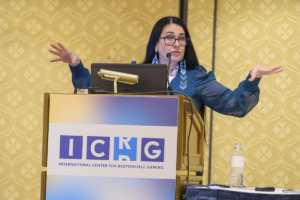 Conference attendees can earn up to 13 continuing education hours approved by healthcare and legal certifying agencies.
Conference attendees can earn up to 13 continuing education hours approved by healthcare and legal certifying agencies.
2 HOURS
Pre-Con Workshop: Treating Gambling Harms: Valuable strategies for engaging and retaining our clients11 HOURS
Sessions held Sunday afternoon through Monday afternoon.AGENCIES THAT HAVE APPROVED ICRG AS A CE PROVIDER
- The International Center for Responsible Gaming is approved by NAADAC, the Association for Addiction Professionals, to offer continuing education (Provider # 100793).
- The International Center for Responsible Gaming is approved by NBCC, National Board of Certified Counselors, as an Approved Continuing Education Provider, ACEP No. 6474. Programs that do not qualify for NBCC credit are clearly identified. The ICRG is solely responsible for all aspects of the programs.
- The International Center for Responsible Gaming (ICRG) is approved by the American Psychological Association to sponsor continuing education for psychologists. The ICRG maintains responsibility for this program and its content.
SINGLE PROGRAM APPROVAL
The ICRG will seek approval of the conference from the International Gambling Counselor Certification Board (IGCCB), The Nevada Board of Continuing Legal Education, the National Association of Social Workers, Nevada Board of Examiners for Social Workers, and the Nevada Certification Board. (Please contact Travis Sztainert at [email protected] if you wish to receive CLEs from other jurisdictions. Visit icrg.org/events to get updates on CE and CLE approvals.)Michael Campos, PhD
UCLA Gambling Studies ProgramJacob Coin
Executive Advisor to the San Manuel Tribal CouncilTonya Elliott, PhD, LMFT
University of Louisiana at MonroeAlan Feldman, PhD
ICRG and University of Nevada, Las VegasJon E. Grant, JD, MD, MPH
The University of ChicagoLojann Hooee, LADAC
San Felipe Behavioral Health and Peopleswork-NMAaron Kaufer, Representative
Pennsylvania House of RepresentativesShane W. Kraus, PhD
University of Nevada, Las VegasLucy Lan, MD, MBA
VA Southern Nevada Healthcare, Las VegasEric Louderback, PhD
Division on Addiction, Cambridge Health Alliance, a teaching hospital of Harvard Medical SchoolGloria Miele, PhD
The Opioid and Stimulant Implementation Support, Training and Technical Assistance program (OASIS-TTA) at UCLA Integrated Substance Abuse ProgramsSarah E. Nelson, PhD
Cambridge Health AllianceMarc N. Potenza, MD, PhD
Yale University School of MedicineDeirdre Querney, MSW, CPGC, CCAC
Alcohol, Drug & Gambling Services, City of HamiltonHugo R. Ramirez
Vision and CompromisoJennifer Shatley, DPP
Responsible Gaming Online AssociationSteven D. Shirk, PhD
University of Massachusetts Chan Medical School and New England VA Mental Illness Research Education and Clinical CenterNathan Smith, PhD
Kindbridge Research InstituteElizabeth Thielen, LPC, PCGC
Nicasa Behavioral Health ServicesJennifer Grant Weinady, PhD
Ohio State UniversityJames Whelan, PhD
University of MemphisDave Yeager
Military Veteran and Kindbrdge Research InstituteCALL FOR POSTERS
POSTER SESSION: OCT. 6, 2024 Deadline for Abstracts: Aug. 15, 2024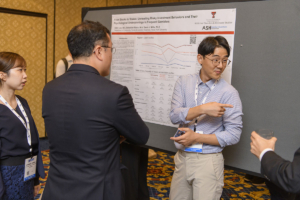 The ICRG showcases new research on gambling disorder and responsible gambling during a poster session and reception held at the ICRG Conference. This event is an opportunity for investigators to report on their empirical research and discuss their findings with conference attendees. Each year, a committee selects the recipients of the Outstanding Poster Award and honorable mention.
The ICRG showcases new research on gambling disorder and responsible gambling during a poster session and reception held at the ICRG Conference. This event is an opportunity for investigators to report on their empirical research and discuss their findings with conference attendees. Each year, a committee selects the recipients of the Outstanding Poster Award and honorable mention.
SUBJECT MATTER
Posters can focus on any aspects of gambling disorder and responsible gambling and must report on empirical research. Abstracts will be reviewed for scientific merit.SUBMISSION GUIDELINES
Abstracts should be submitted electronically in MS Word® or another word processing software using a font size no smaller than 12 pt. PDFs will not be accepted. Please include the following information:- Title of Presentation
- Name(s) and affiliation(s) of the author(s)
- Email address of the first author
- Poster abstract (no more than 500 words). Please follow APA format for text and references. The abstract should address the following:
- Sample and methods
- Preliminary findings
- Implications for the field
- Digital signature of first author certifying that any work with human or animal subjects in the abstract complies with the guiding policies and principles for experimental procedures of the World Medical Association of Helsinki.
| Regular Thru Sept. 27 | Onsite Sept. 27-Oct. 6 | ||
| Full Conference | $375 | $550 | |
| Full Conference - Student | $195 | $395 | |
| Full Conference - Treatment Provider | $195 | $395 | |
| Sunday Only | $200 | $400 | |
| Monday Only | $250 | $450 |
| Regular Thru Sept. 27 | |
|---|---|
| $375 | Full Conference |
| $195 | Full Conference - Student |
| $195 | Full Conference - Treatment Provider |
| $200 | Sunday Only |
| $250 | Monday Only |
| Onsite Sept. 27-Oct. 6 | |
| $550 | Full Conference |
| $395 | Full Conference - Student |
| $395 | Full Conference - Treatment Provider |
| $400 | Sunday Only |
| $450 | Monday Only |



